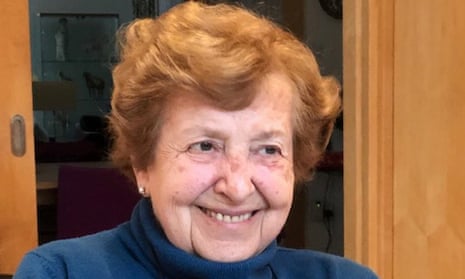Dora Black, who has died aged 89 of cancer, was a pioneering child and adolescent psychiatrist who voiced a much-needed refrain, “but what about the children?”, in situations where young people’s emotional needs were not being considered. She became an international expert in helping children where one parent, nearly always the father, had killed the other.
Dora began to receive such referrals in the 1980s, eventually becoming involved in about 700 cases. Many of the children had witnessed the killing and were able to describe to her the traumatic events, sometimes through pictures. Assessment of these troubling cases demanded an approach encompassing the many parties involved.
They included not only the guilty parent, but also grandparents and the criminal law and child protective services, all of which were directly impinging on the children’s lives. Dora ensured that the child’s interests remained paramount in this traumatic web. Despite the very large number of children referred, she was able to extend individual attention to each child, sometimes accompanying them to visit the surviving parent in prison.
Dora’s interest in bereaved children had begun earlier, in the 1970s. Up till then, Cruse, the National Charity for Bereavement Care, had focused on helping widows. She initiated the inclusion of bereaved children and widowers, and served as the charity’s vice chair (1975-90).
Granted a Winston Churchill travelling fellowship in 1993, she studied trauma services for children in the US. Then, in 1995, with Dr Stuart Turner, she established the Camden NHS traumatic stress clinic in central London. Its unique feature was the inclusion of all family members – children as well as adults who had been affected by traumatic events.
Although describing herself as a clinician, Dora published widely and lectured all over the world, especially on the management of bereaved children. A second edition of her multi-authored seminal book, When Father Kills Mother (1983), was issued in 2000. She was invited in 1999 to become a member of the Home Office review of prison mother and baby units. While material needs such as nappies and baby milk were well supplied, the often troubled mother-child relationship was neglected. Among her contributions was the appointment of nursery nurses in all these prisons.
Born in north London, Dora was the elder daughter of Rachel (nee Saetah) and Philip Braham, a manufacturer of tubular steel furniture. Together with her mother and sister, she was evacuated in 1940 to New York, later joining her father, then a liaison officer between the RAF and the Royal Canadian Air Force, in Canada.
Returning to London in 1945, she attended Hendon county grammar school, where she met Jack Black, her husband-to-be, when both were aged 15. She was the first in her family to attend university. Determined to read medicine, despite the government’s instructions in 1947 to increase the tiny number of female medical students she still had to make 21 applications before being accepted at Birmingham University medical school, from which she graduated with honours in 1955. This experience led her to a lifelong involvement with the Medical Women’s Federation.
After junior medical and surgical appointments, she trained in psychiatry at the Maudsley hospital, London. She chose to practise child and adolescent psychiatry, which enabled her to work part-time until 1984. Her first consultant post was in St Albans and Watford in 1966. Two years later she moved to Edgware general hospital, where she became one of the first child psychiatrists to establish paediatric liaison services.
Moving to a full-time consultant post at the Royal Free hospital in 1984, she extend her clinical activity and drive to helping children who had been traumatised, and established the first children’s trauma clinic in the UK. With increasing national recognition, Dora began to receive referrals from the whole UK of, often young, children, from families where one parent had killed the other, leading to the establishment of the traumatic stress clinic. After retirement from the NHS in 1997, she continued to work as an honorary consultant at the traumatic stress clinic until 2005. She then extended her work as an expert witness in family court proceedings until her final retirement in 2013.
Dora ascribed her capacity to cope emotionally with the many harrowing situations she encountered to her own settled childhood; the indispensable teams with whom she worked; the fact of making a positive change to children’s lives; and to the constant support of Jack.
Dora had a forceful personality. When she was 17, her headteacher’s report read: “Dora still does not suffer fools gladly but she now lets them down more lightly.” However, what marked her out was her unremitting concern for children’s wellbeing, which she achieved through her determination, tenacity and energy. As part of her persuasive personality, she was an inspiration for others. Her warm, caring nature and love towards her family and lasting friendships were laced with humour and a zest for life.
She married Jack, by then a solicitor, in 1955, and they had three children. While actively engaged in their own careers, Dora and Jack were an inseparable unit, collecting honorary grandchildren as they travelled the world, often to each other’s conferences. They read avidly together and enjoyed theatre and music, which was a passion in the household. She was happy to see their only grandchild, Matthew’s, passing out parade at Sandhurst.
Dora is survived by Jack, their children Andrew and Sophie, and grandson, Matthew, and her sister Elaine. Another child, David, died in 2010.

Comments (…)
Sign in or create your Guardian account to join the discussion